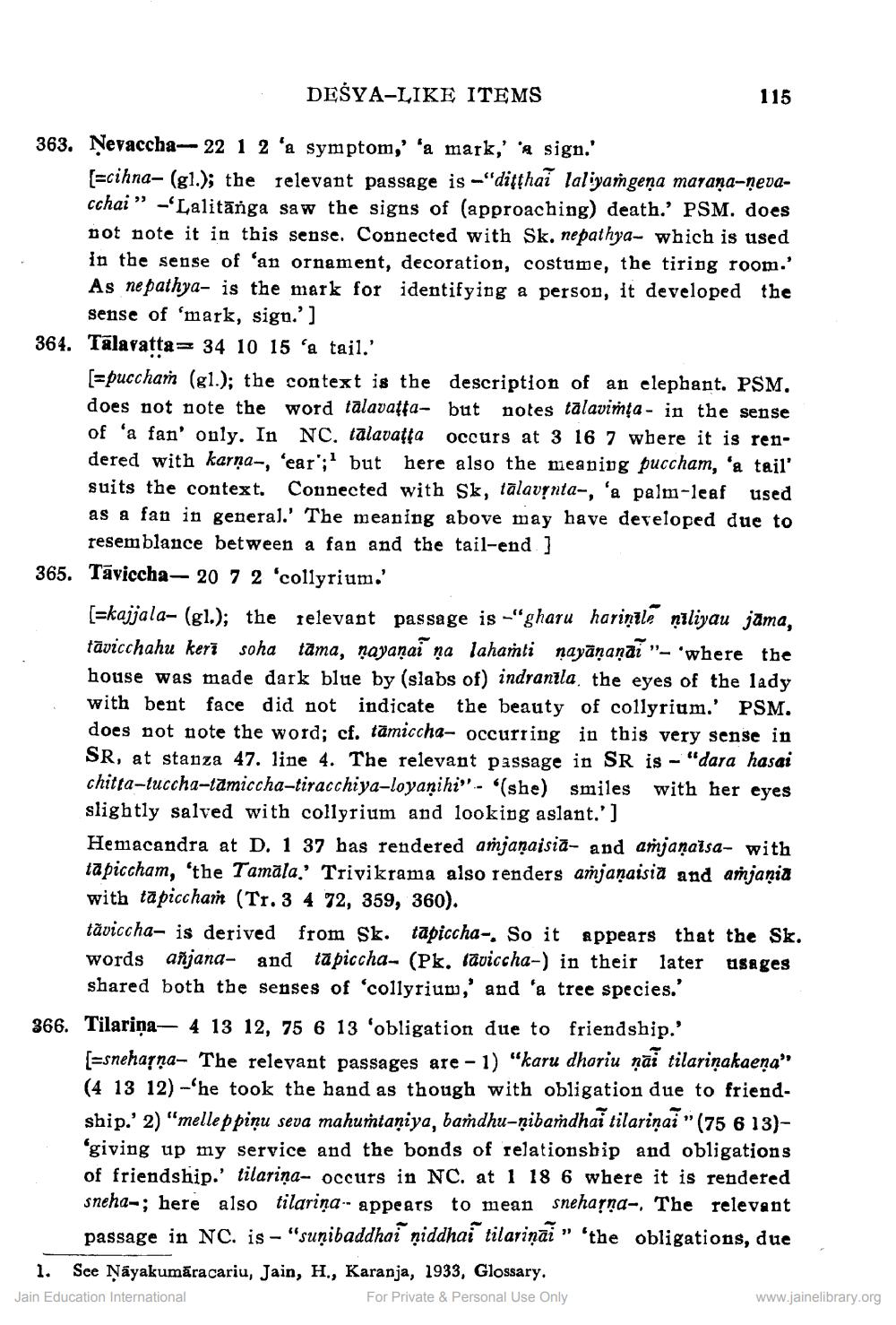________________
DEŠYA-LIKE ITEMS
115
363. Ņevaccha-- 22 1 2 'a symptom,' 'a mark,' a sign.'
=cihna- (gl.); the relevant passage is "ditthai laliyamgeņa marana-nevacchai” -'Lalitānga saw the signs of (approaching) death.' PSM. does not note it in this sense. Connected with Sk, nepathya- which is used in the sense of 'an ornament, decoration, costume, the tiring room.' As ne pathya- is the mark for identifying a person, it developed the
sense of 'mark, sign.'] 364. Tālavatta= 34 10 15 'a tail.'
[=pucchar (gl.); the context is the description of an elephant. PSM. does not note the word talavatta- but notes talavimța - in the sense of 'a fan' only. In NC, talavatta occurs at 3 16 7 where it is rendered with karna-, fear';' but here also the meaning puccham, 'a tail' suits the context. Connected with Sk, talavrnta-, 'a palm-leaf used as a fan in general.' The meaning above may have developed due to
resemblance between a fan and the tail-end ] 365. Tāviccha- 20 7 2 'collyrium.'
[=kajjala- (gl.); the relevant passage is -"gharu harinilē ņiliyau jāma, tāvicchahu keri soha tama, nayanai na lahati nayāņaņai "- 'where the house was made dark blue by (slabs of) indranila, the eyes of the lady with bent face did not indicate the beauty of collyrium.' PSM. does not note the word; cf. tämiccha- occurring in this very sense in SR, at stanza 47. line 4. The relevant passage in SR is - "dara hasai chitta-luccha-tāmiccha-tiracchiya-loyanihi''. '(she) smiles with her eyes slightly salved with collyrium and looking aslant.') Hemacandra at D. 1 37 has rendered amjanaisia- and amjanaisa- with ta piccham, 'the Tamala.' Trivikrama also renders amjanaisia and amjania with ta piccham (Tr.34 72, 359, 360). tăviccha- is derived from Sk. tapiccha-, So it appears that the Sk. words añjana- and ta piccha- (Pk, tāviccha-) in their later usages
shared both the senses of 'collyrium,' and 'a tree species.' 366. Tilariņa— 4 13 12, 75 6 13 'obligation due to friendship.'
[=snehasna- The relevant passages are - 1) "karu dhariu ņāī tilarinakaena” (4 13 12) - he took the hand as though with obligation due to friendship.' 2) "melle ppiņu seva mahurtaniya, bamdhu=ņibamdhai tilariņai " (75 6 13)'giving up my service and the bonds of relationship and obligations of friendship.' tilarina- occurs in NC. at 1 18 6 where it is rendered sneha-; here also tilariña-- appears to mean snehasna-, The relevant
passage in NC. is - "suņibaddhai niddhai tilariņāi” 'the obligations, due 1. See Nayakumāra cariu, Jain, H., Karanja, 1933, Glossary, Jain Education International For Private & Personal Use Only
www.jainelibrary.org




